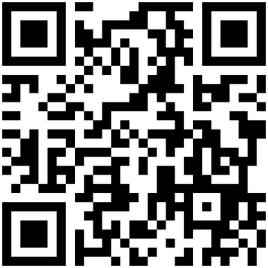
Welcome to FungusCME.org
FungusCME.org is the official continuing education site of the collaboration of the Mycoses Study Group Education & Research Consortium and Terranova Medica. The MSG-ERC’s mission includes setting the annual educational and research agendas for mycology and providing top-quality continuing education initiatives to MSG-member institutions and to other institutions and practitioners throughout the United States and globally. We thank our generous commercial supporters for their commitment to our live and web-based continuing education efforts. We hope you enjoy the variety of continuing activities present on this site, and we welcome your input on ongoing educational needs in the area of invasive mycoses.
Featured Course
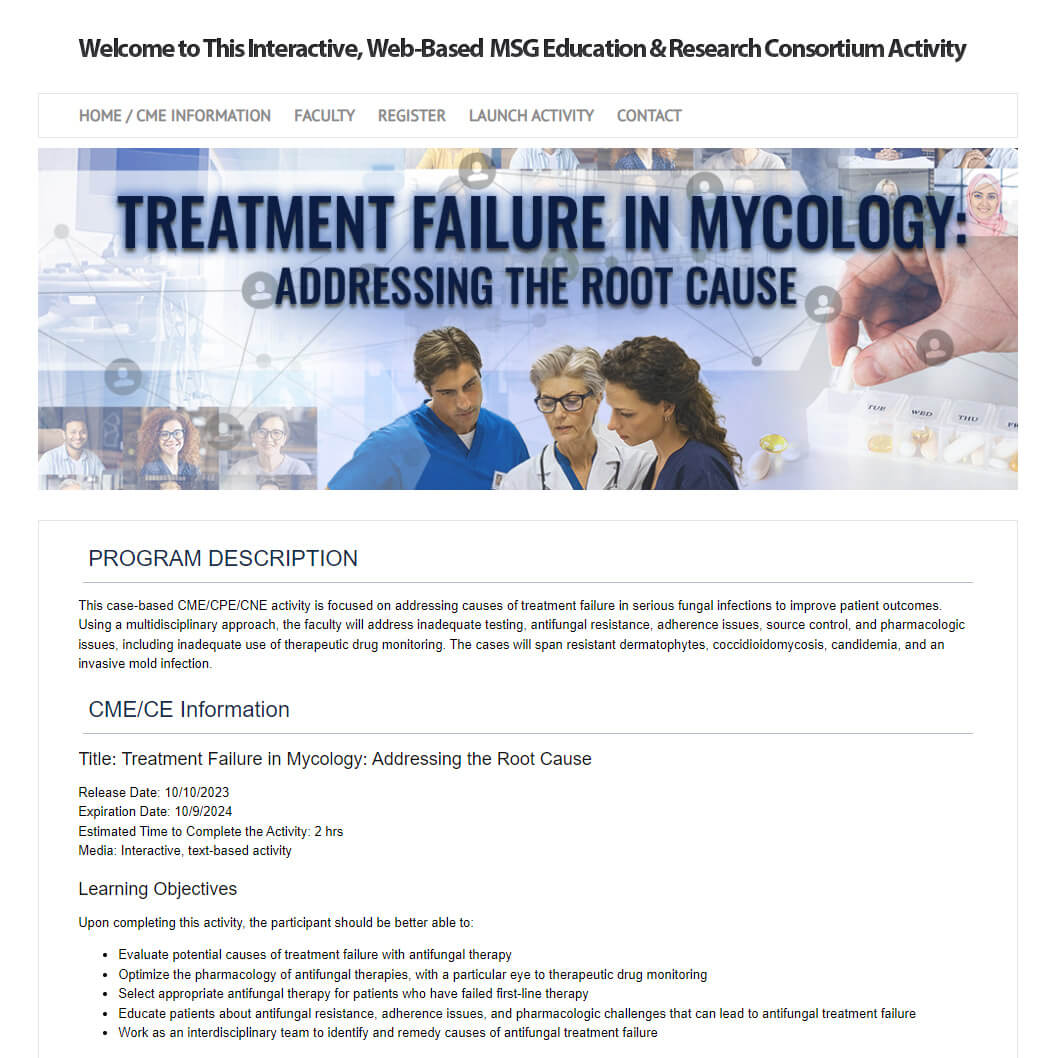
Treatment Failure in Mycology: Addressing the Root Cause
This case-based CME/CPE/CNE activity is focused on addressing causes of treatment failure in serious fungal infections to improve patient outcomes. Using a multidisciplinary approach, the faculty will address inadequate testing, antifungal resistance, adherence issues, source control, and pharmacologic issues, including inadequate use of therapeutic drug monitoring. The cases will span resistant dermatophytes, coccidioidomycosis, candidemia, and an invasive mold infection.
Course Catalog
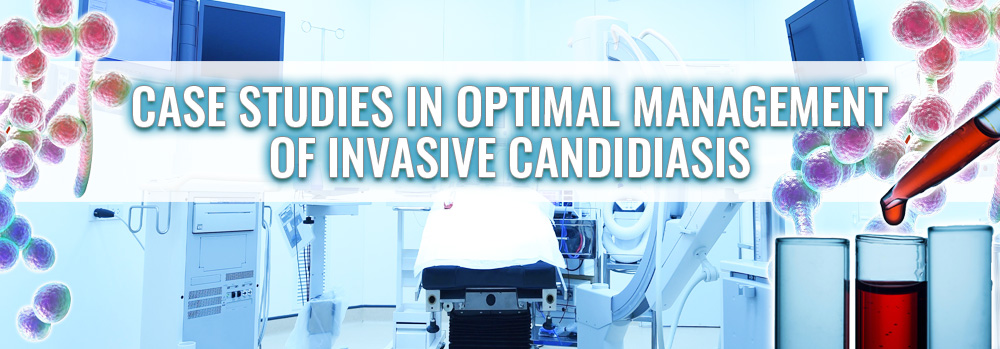
New Activity! Case Studies in Optimal Management of Invasive Candidiasis
This multimedia CME/CPE enduring activity from the live MSGERC Town Hall held on July 7, 2023, discusses the newest trends in the management of invasive candidiasis. The expert faculty discuss hospital and health care-associated infection scenarios: a patient coming in from a long-term acute care hospital (LTACH), an invasive fungal infection in a stem cell transplant patient, and an intra-abdominal infection in a hospitalized surgical patient.
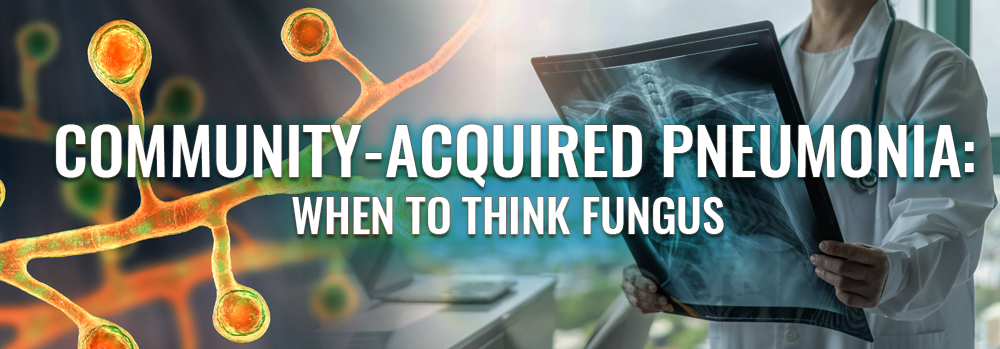
Community-Acquired Pneumonia: When to Think Fungus
This CME/CNE/CPE activity will explore community-acquired pneumonia cases, illustrating when to consider coccidioidomycosis, blastomycosis, and histoplasmosis endemic mycoses as potential etiologies. The activity will feature use of CDC/MSGERC/CSG algorithms to recognize patients at risk for these infections as well as diagnostic strategies. This activity was developed for a target audience of primary care providers, specialists who prescribe biologics, pulmonologists, as well as urgent care and emergency medicine providers who see patients with community acquired pneumonia.
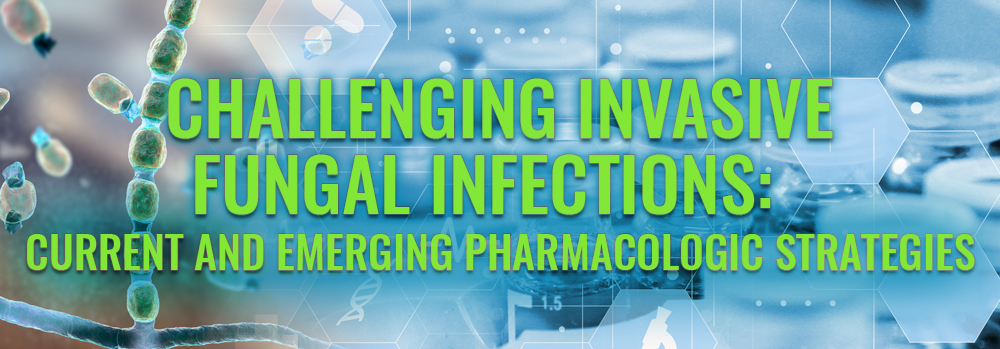
Challenging Invasive Fungal Infections: Current and Emerging Pharmacologic Strategies
The optimal management of invasive fungal infections requires a collaborative approach focused on optimal agent selection, pharmacologic optimization, and a clear strategy to identify and address treatment failure. For some pathogens, the challenge is further exacerbated by the limitations of existing regimens. Fortunately, emerging therapeutic approaches show promise for a range of invasive mycoses. In this activity, featuring cases from the virtual live event MSGERC Town Hall: Challenging Invasive Fungal Infections, mycology experts illustrate strategies to optimize the management of challenging invasive mold and Coccidioides infections. The activity features mycology experts Drs Luis Ostrosky-Zeichner, George R. Thompson III, and James Lewis, with additional commentary from Dr Nathan Wiederhold.
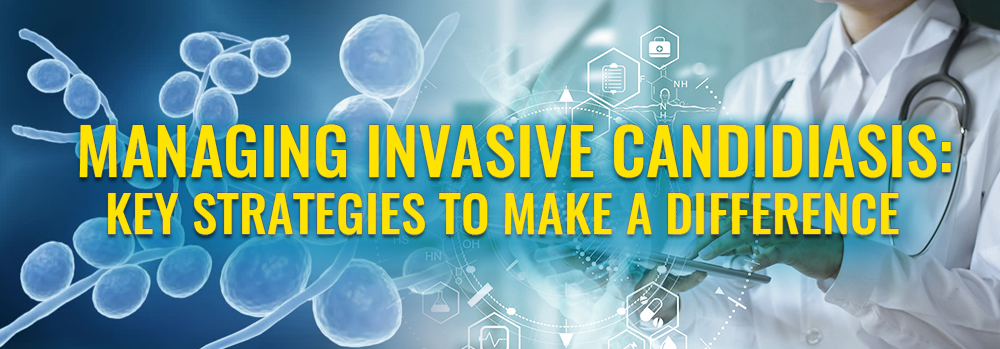
Managing Invasive Candidiasis: Key Strategies to Make a Difference
In this activity, Drs Ostrosky-Zeichner and Peter Pappas illustrate strategies to make a difference in the management of invasive candidiasis. Using an infographic approach to reinforce key concepts, they make a compelling call to action for more state-of-the-art management of this common fungal infection.
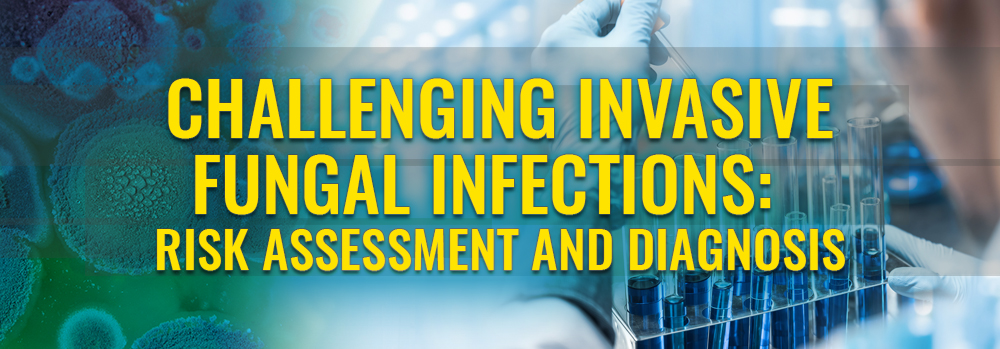
Challenging Invasive Fungal Infections: Risk Assessment and Diagnosis
Thinking fungus, diagnosing the fungal pathogen to the genus and species level, and addressing antifungal resistance are key steps to improving outcomes for invasive fungal infections (IFIs). This activity, featuring cases from the virtual live event MSGERC Town Hall: Challenging Invasive Fungal Infections, is designed to help clinicians identify at-risk patients and secure the IFI diagnosis. It will highlight the problem with low awareness of endemic mycoses as potential causes of CAP as well as the importance of appropriate use of antifungal susceptibility testing. The activity features mycology experts Drs Luis Ostrosky-Zeichner, George R. Thompson III, and Nathan Wiederhold,with additional commentary by Dr James Lewis.
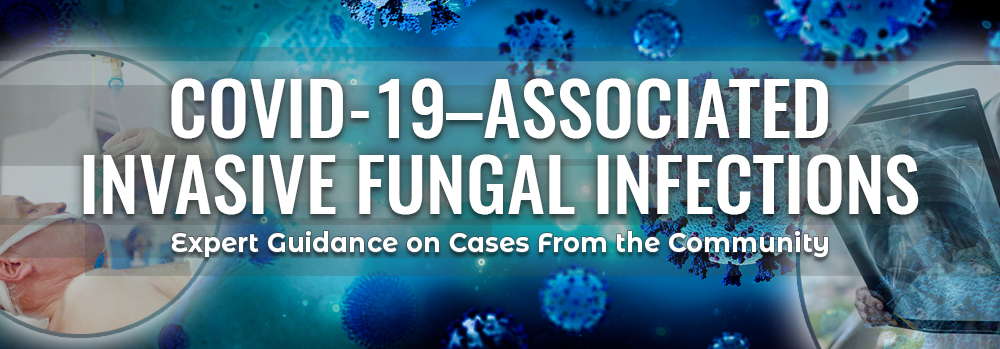
COVID-19–Associated Invasive Fungal Infections: Expert Guidance on Cases From the Community
Patients with severe COVID-19 who require mechanical ventilation are at increased risk for invasive fungal infections (IFIs), which increase morbidity and mortality. As part of a CDC Cooperative agreement, the faculty for the COVID-19–associated Fungal Infections Educational Initiative have developed a series of tools for diagnosing and managing these IFIs. In this interactive, case-based activity, mycology experts Drs George R. Thompson, III; Dimitrios Kontoyiannis; and Minh-Hong Thi Nguyen apply these tools in challenging COVID-19–associated IFI cases submitted by community clinicians. The activity addresses COVID-19—associated pulmonary aspergillosis (CAPA), COVID-19--associated mucormycosis, and coccidioidomycosis relapse after recovery from COVID-19.
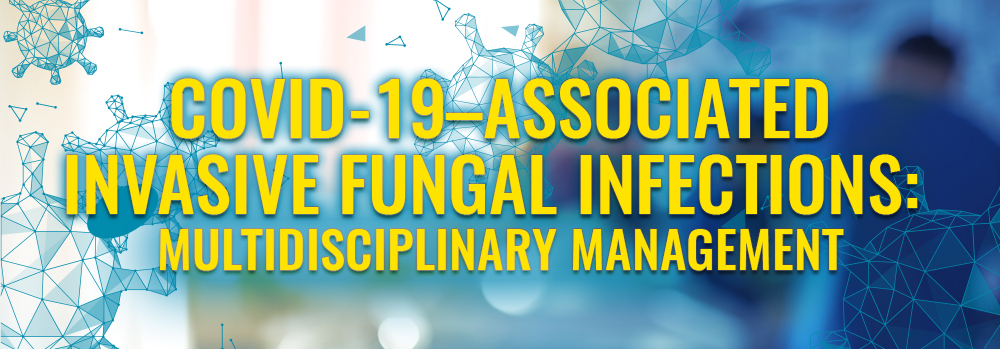
COVID-19—Associated Invasive Fungal Infections: Multidisciplinary Management
Patients with severe COVID-19 who require mechanical ventilation are at increased risk for invasive fungal infections (IFIs). However, many clinicians do not have a strategy to screen for these infections. As part of a CDC Cooperative agreement, the faculty for the COVID-19–Associated Fungal Infections Educational Initiative (https://covidandfungus.org/) have developed a series of tools to assist healthcare providers in recognizing and managing these infections. In this interactive, case-based activity, expert faculty from the disciplines of infectious diseases/medical mycology, pulmonology, intensive-care medicine, and infectious diseases pharmacy weigh in on challenging COVID-19–associated IFI cases. Join them as they work together to develop strategies for the management of candidemia, COVID-19—associated pulmonary aspergillosis, and cryptococcosis in patients with severe COVID-19.
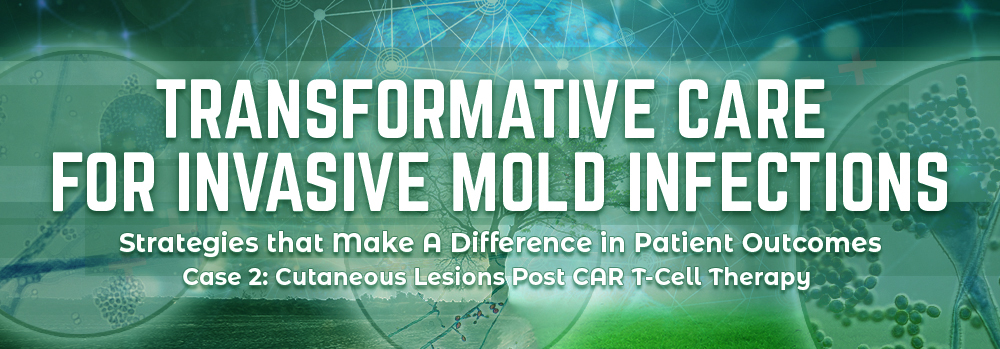
Cutaneous Lesions Post CAR T-Cell Therapy, Case 2 of Transformative Care for Invasive Mold Infections: Strategies that Make a Difference in Patient Outcomes
In the second case of this initiative moderated by Dr Luis Ostrosky-Zeichner, Dr Matthew Lunning presents a case of cutaneous lesions post CAR T-cell therapy in a patient with large B-cell lymphoma. The critical care/pulmonary perspective is provided by Chadi Hage, the infectious diseases perspective by Marisa Miceli, and the microbiologic perspective by Dr Nathan Wiederhold. Benchmark your practices and evaluate your institutional barriers to appropriate care of this challenging case involving cell-mediated therapy for a hematologic malignancy.

Mediastinal Mass Post Lung Transplant, Case 1 of Transformative Care for Invasive Mold Infections: Strategies that Make a Difference in Patient Outcomes
In this text- and audio- panel discussion moderated by Dr Luis Ostrosky-Zeichner, Dr Chadi Hage presents a case illustrating the diagnosis and management of a mediastinal mass post lung transplantation. The critical care/pulmonary perspective is provided by Dr Hage, the infectious diseases perspective by Dr Marisa Miceli, and the microbiologic perspective by Dr Nathan Wiederhold. Benchmark your practices and evaluate your institutional barriers to appropriate care of patients with invasive fungal disease in the critical care setting.
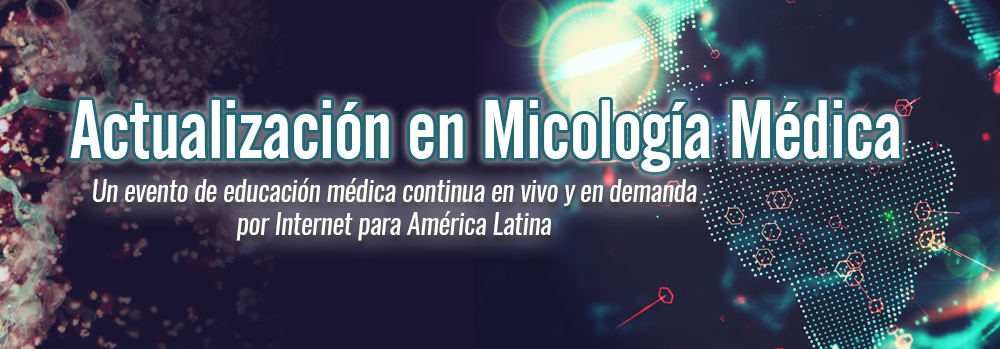
Updates in Medical Mycology: Archived Content from a CME Webcast Activity for Latin America
This Spanish language CME has been designed to address unmet educational needs regarding invasive yeast/endemic mycoses and mold infections in Latin America. Using a case-based approach, the activity features video lectures from Drs Francisco Marty and Arnaldo Lopes Colombo, with a recorded Q/A moderated by the chairperson, Luis Ostrosky-Zeichner.
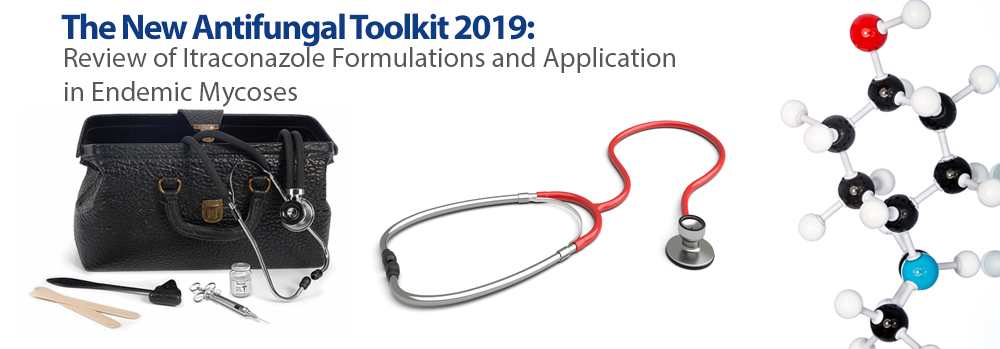
The New Antifungal Toolkit 2019: Review of Itraconazole Formulations and Application in Endemic Mycoses
Originally launched in 2014 and updated through 2019, The New Antifungal Toolkit is an Internet CME curriculum that provides current information about newer FDA-approved agents/formulations for the management of invasive fungal infections (IFIs) and evaluates their role in strategies to optimize antifungal therapy. In the 2019 updates, we provide a review of SUBA-itraconazole, updates on endemic mycoses, as well as updates to the pharmacopeia section.
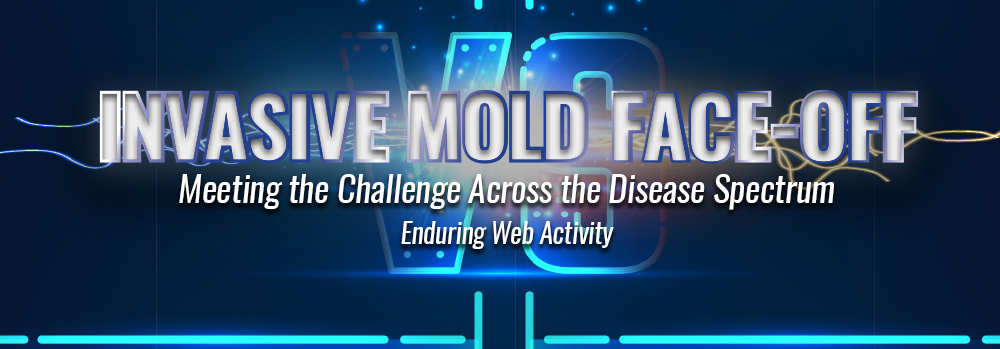
Invasive Mold Face-Off: Meeting the Challenge Across the Disease Spectrum—Enduring Web Activity
Invasive molds can be formidable foes for clinicians to face off with. In this highly interactive and visual case-based activity, Drs John Perfect, Tom Patterson, and Francisco Marty provide expert perspective on the prevention and management of invasive molds. Addressing topical issues such as cryptic Aspergillus spp and azole resistance, aspergillosis associated with influenza, antifungal prophylaxis and breakthrough infections, mucormycosis diagnosis and treatment, green herring syndrome, and diagnosis and management of fusariosis, this fast-paced activity will arm you with the tools you need to effectively face off against these challenging fungal infections.
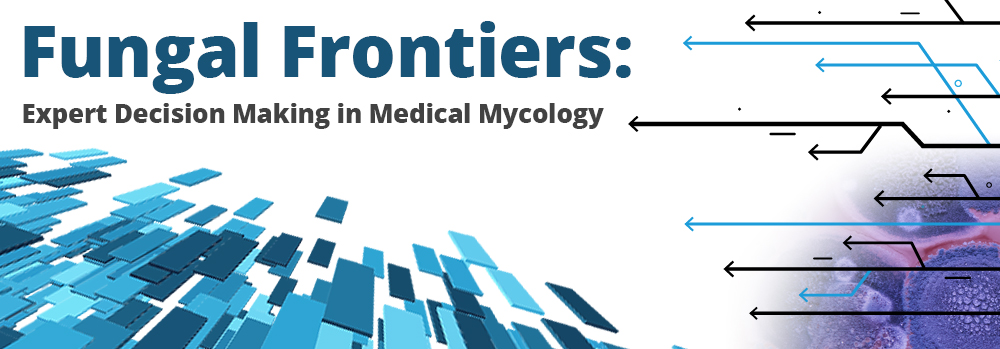
Fungal Frontiers: Expert Decision Making in Medical Mycology
This interactive, multimedia activity is designed to evaluate different approaches to managing clinical scenarios at the frontiers of invasive fungal infections. Explore the levels of evidence behind different strategies, contrasting expert decision making with your own approach and those of your peers. Specific content on Candida auris infection, pharmacologic aspects of antifungal prophylaxis in an HSCT patient, and management of a refractory mold infection will be provided.
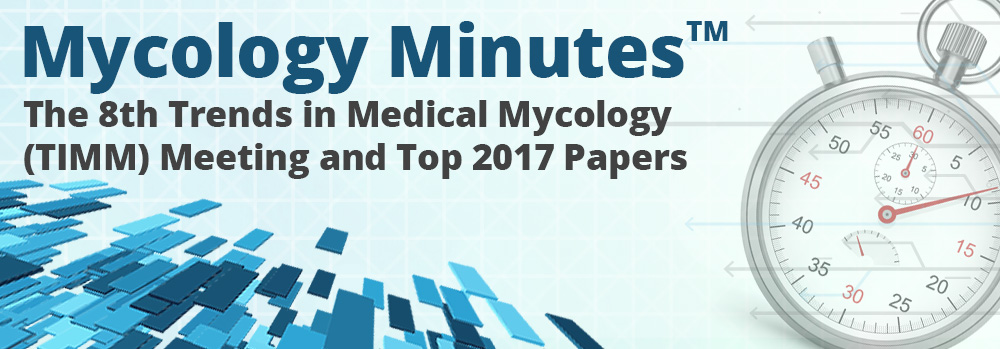
Mycology MinutesTM from the 8th Trends in Medical Mycology (TIMM) Meeting and Top 2017 Papers
Dr Sibylle Mellinghoff reviews high-impact poster/oral presentations and papers related to diagnostics, including MALDI-TOF, GM testing, β-D-glucan testing, fungus-specific T cells, as well as therapeutic dose monitoring, multidrug-resistant fungi, mold lung infections, and emerging therapeutics. Dr Martin Hönigl provides an overview of the clinical implications of this research. We hope you find these timely updates helpful for you in caring for patients with invasive fungal disease.
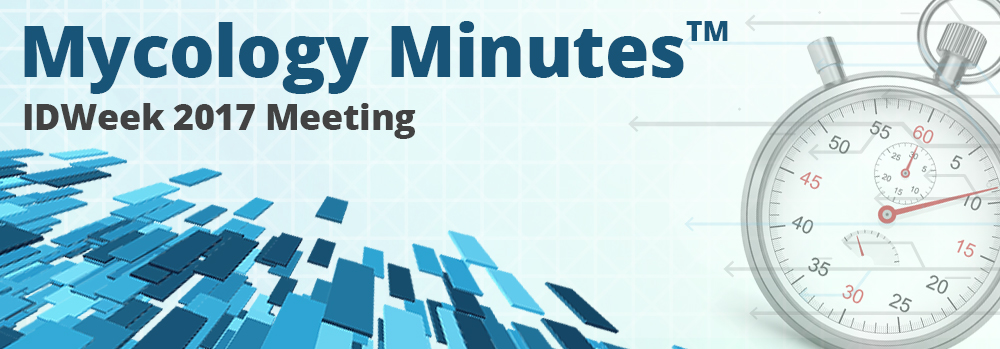
Mycology MinutesTM from the IDWeek 2017 Meeting
Dr Justin Hayes of the University of Alabama School of Medicine (UAB) reviews recent data on: the impact of ID consultation/diagnostics on candidemia outcomes; Candida auris and antifungal resistance; antifungal prophylaxis; and CNS histoplasmosis and screening for cryptococcal antigenemia in solid organ transplant recipients. Dr Peter G. Pappas, also of UAB, provides a clinical commentary on these studies. We hope you find this edition of the Minutes an enlightening and thought-provoking encapsulation of emerging science/data in mycology.

The New Antifungal Toolkit 2017: The Pharmacopeia and Beyond
Originally launched in 2014 and updated through 2016, The Antifungal Toolkit: The Pharmacopeia and Beyond is an Internet CME curriculum that provides current information about newer FDA-approved agents/formulations for the management of invasive fungal infections (IFIs) and evaluates their role in strategies to optimize antifungal therapy. In the 2017 updates, we have updated the discussion of newer agents/formulations, emerging agents/diagnostics, and pharmacologic principles/data.
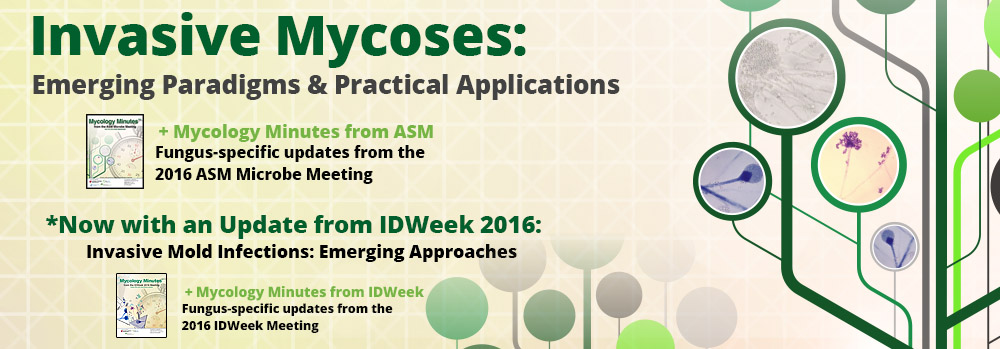
Invasive Mycoses: Emerging Paradigms & Practical Applications (Now with an update from IDWeek 2016)
This is an interactive, enduring multimedia activity based on content presented at the 2016 MSGERC symposium at ASM Microbe. With content spanning from updates on diagnostics and pharmacologic considerations for therapies to challenges in the management of invasive aspergillosis, invasive mucormycosis, and breakthrough infections, this activity addresses key clinical issues for optimal invasive fungal disease (IFD) management. In addition, we have also included fungus-specific updates from the Microbe meeting in the companion Mycology Minutes™ activity (see link below). We hope you find these activities helpful as you hone and update your strategies for managing these difficult infections.
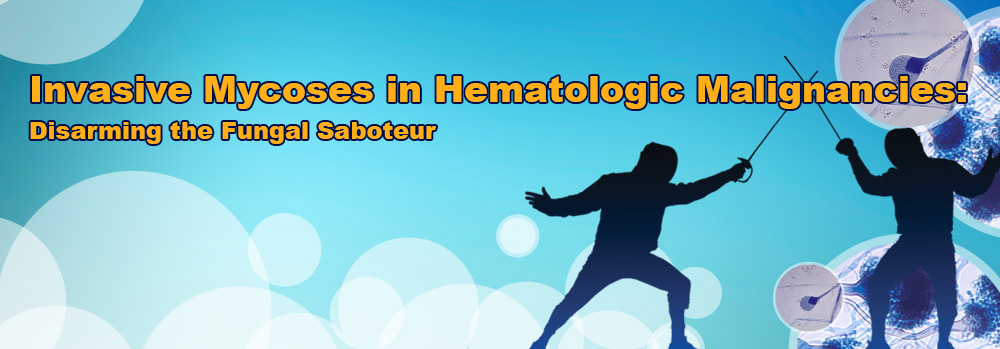
Invasive Mycoses in Hematologic Malignancies: Disarming the Fungal Saboteur
In this interactive, enduring multimedia activity based on a 2015 American Society of Hematology Satellite Symposium, experts in hematology/oncology, infectious diseases, and pharmacy discuss optimal strategies to prevent and treat invasive mycoses in hematologic malignancy patients. This initiative features both video and text-based presentations of key epidemiologic data, diagnostic and therapeutic options, pharmacologic considerations, and guidelines/expert opinion on strategies to decrease the spectre of invasive fungal infections for patients with hematologic malignancies. It features in-depth discussion of real-world issues encountered in optimizing therapy and an international, esteemed faculty.
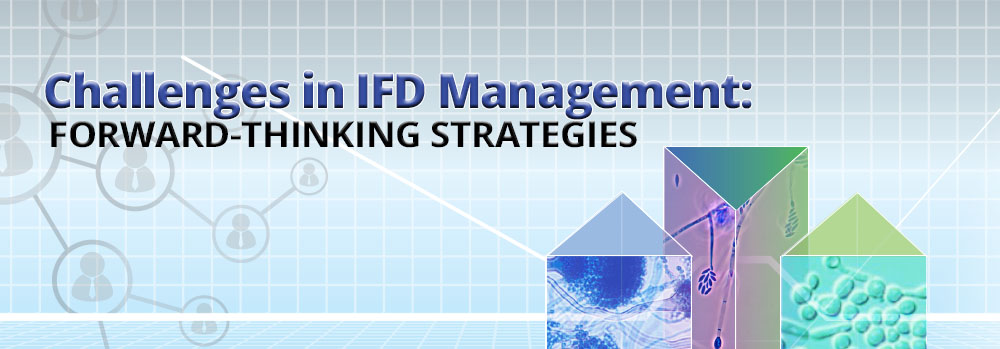
Challenges in IFD Management: Forward-Thinking Strategies
Challenges in IFD Management: Forward-Thinking Strategies is an enduring activity based on content presented at 2015 MSG-ERC symposia at ICAAC/ICC and ID Week. The activity is designed to provide top-line updates on invasive fungal disease (IFD) diagnostics and therapeutics as well as controversial/forward-looking topics in mycology reviewed in a panel-discussion format. The activity includes relevant, interactive case challenges that highlight practical aspects of IFD case, interdisciplinary management, as well as international perspectives on patient-care strategies.
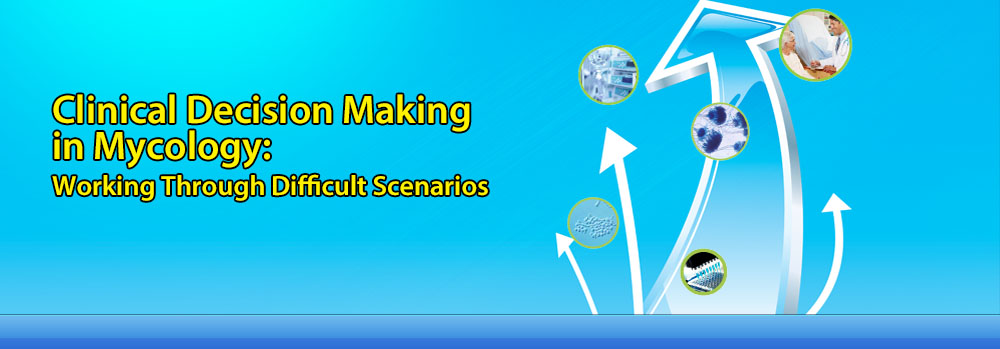
Clinical Decision Making in Mycology: Working Through Difficult Scenarios
Clinical Decision Making in Mycology: Working Through Difficult Scenarios is the enduring activity from the Mycoses Study Group Education & Research Consortium (MSG-ERC) CME symposium presented at ICAAC 2014. This activity is designed to address the relationship between decision making and outcomes in invasive mycoses. After an introduction and review of emerging therapeutic and diagnostic options, the activity will turn to an in-depth exploration of 2 cases—a hematologic malignancy and an intensive care unit case—that illustrate key decision points affecting potential outcomes across the disease spectrum. By using a branching, decision-tree approach that follows the cases out to potential logical conclusions, the activity challenges learners to evaluate their own practice patterns in an effort to overcome barriers and achieve better outcomes for invasive fungal infections (IFIs).

The New Antifungal Toolkit: The Pharmacopeia and Beyond (2014)
The New Antifungal Toolkit: The Pharmacopeia and Beyond is an Internet CME curriculum that will provide current information about new FDA-approved agents/formulations for the management of invasive fungal infections (IFIs) and evaluate the role of these newer options in strategies to optimize antifungal therapy. As such, the activity will move beyond the typical drug pharmacopeia to address dosing in special populations (eg, pediatrics, patients with renal insufficiency, specific host types), health economic data, as well as comparative effectiveness, where appropriate. The activity will also include a broader pharmacopeia of all FDA-approved agents for invasive mycoses as a useful point of comparison as well as a practice reference. Planned updates at 4 and 8 months will cover any additional FDA approvals and keep the learner up to date as research data for newer agents mature and clinical experience grows.

Invasive Fungal Infections After Solid Organ Transplantation
In this interactive, enduring, multimedia activity is based on the third and final component of the ICAAC 2013 satellite symposium, Invasive Mycoses: Consider the Source, Consider the Host. In Invasive Fungal Infections After Solid Organ Transplantation, Barbara D. Alexander, MD, MHS, FIDSA, discusses a case highlighting the management of an invasive mold infection in a patient post lung transplantation. In this activity, Dr Alexander reviews fungal epidemiology based on type of organ transplanted and time from transplantation, explores the performance characteristics of fungal diagnostics specifically in the SOT setting, reviews the guidelines for management of fungal infections in SOT, and discusses genomics and other host defense issues impacting response to therapy. The activity will also include bonus material about current and emerging antifungal therapy and diagnostic options (developed by Peter G. Pappas, MD, FACP).

Pediatric Mycoses: Same But Different
In this interactive, enduring, multimedia activity is based on the second component of a liveICAAC 2013 satellite symposium, Theoklis Zaoutis, MD, MSCE, discusses cases illustrating the state-of-the-art management of invasive fungal infections (IFIs) in children. Highlighting important issues for the prevention and management of invasive candidiasis and invasive mold infections in oncology and ICU settings, Dr Zaoutis also reviews the levels of evidence behind different diagnostic tests in children, drug dosing strategies, as well as the role of therapeutic dose monitoring. The activity will also include bonus material about current and emerging antifungal therapy and diagnostic options (developed by Peter G. Pappas, MD, FACP).




